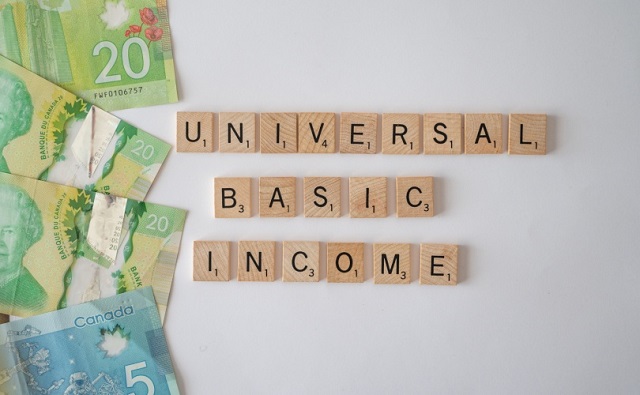Economy
Taxpayer watchdog warns Canadians to fight against ‘guaranteed income schemes’

From LifeSiteNews
The House of Commons recently rejected a New Democratic Party-led bill that would have allowed for a universal basic income instead of ‘cutting taxes and letting Canadians keep more of their own money,’ said Franco Terrazzano of the Canadian Taxpayers Federation.
Canada’s most respected taxpayer watchdog group called on citizens to oppose as much as possible the policies and laws pushed by the Liberal government of Prime Minister Justin Trudeau and opposition parties.
“Taxpayers must stay vigilant and keep pushing back against this extremely costly scheme,” Franco Terrazzano, federal director of the Canadian Taxpayers Federation (CTF), told LifeSiteNews.
“Bad ideas never seem to go away in Ottawa, so taxpayers must stay alert and continue to push politicians to fight against guaranteed income schemes.”
In recent weeks, the House of Commons voted down an extreme New Democratic Party-proposed law that would have allowed for a universal basic income (UBI) for all Canadians and refugee claimants.
Instead of focusing on handouts, Terrazzano noted, the government should instead be “making life more affordable by cutting taxes and letting Canadians keep more of their own money.”
“The government is broke and is more than $1 trillion in debt so this expensive scheme would mean massive tax hikes for average Canadians,” he told LifeSiteNews.
Terrazzano observed how the New Democratic Party’s UBI “scheme” would have been a “disaster for taxpayers, businesses and our economy, and all politicians should fight against this.”
“It would make it harder for Canadian businesses to find and retain talent because if the government pays people not to work, fewer people will work,” he said.
While the New Democratic Party’s attempt at passing a UBI bill into law failed, there is another similar bill before Canada’s Senate that, if passed, would establish “a national framework for a guaranteed livable basic income.”
Senate Bill S-233 is now before a committee, but it has not gone to the House of Commons yet. The bill was introduced by Trudeau-appointed Senator Kim Pate in 2021.
The cost of living in Canada has risen dramatically over the last few years under the Trudeau government, which continues to overspend and promote its ideologically charged agenda.
In June, LifeSiteNews reported that decades of progress in lowering the poverty rate in Canada has been wiped out in the last few years under Trudeau’s Liberal government.
Terrazzano previously told LifeSiteNews that he urged the Trudeau government to cut spending, balance the budget and “completely scrap” the “carbon tax,” as the best way to help struggling Canadians financially.
Business
Socialism vs. Capitalism

People criticize capitalism. A recent Axios-Generation poll says, “College students prefer socialism to capitalism.”
Why?
Because they believe absurd myths. Like the claim that the Soviet Union “wasn’t real socialism.”
Socialism guru Noam Chomsky tells students that. He says the Soviet Union “was about as remote from socialism as you could imagine.”
Give me a break.
The Soviets made private business illegal.
If that’s not socialism, I’m not sure what is.
“Socialism means abolishing private property and … replacing it with some form of collective ownership,” explains economist Ben Powell. “The Soviet Union had an abundance of that.”
Socialism always fails. Look at Venezuela, the richest country in Latin America about 40 years ago. Now people there face food shortages, poverty, misery and election outcomes the regime ignores.
But Al Jazeera claims Venezuela’s failure has “little to do with socialism, and a lot to do with poor governance … economic policies have failed to adjust to reality.”
“That’s the nature of socialism!” exclaims Powell. “Economic policies fail to adjust to reality. Economic reality evolves every day. Millions of decentralized entrepreneurs and consumers make fine tuning adjustments.”
Political leaders can’t keep up with that.
Still, pundits and politicians tell people, socialism does work — in Scandinavia.
“Mad Money’s Jim Cramer calls Norway “as socialist as they come!”
This too is nonsense.
“Sweden isn’t socialist,” says Powell. “Volvo is a private company. Restaurants, hotels, they’re privately owned.”
Norway, Denmark and Sweden are all free market economies.
Denmark’s former prime minister was so annoyed with economically ignorant Americans like Bernie Sanders calling Scandanavia “socialist,” he came to America to tell Harvard students that his country “is far from a socialist planned economy. Denmark is a market economy.”
Powell says young people “hear the preaching of socialism, about equality, but they don’t look on what it actually delivers: poverty, starvation, early death.”
For thousands of years, the world had almost no wealth creation. Then, some countries tried capitalism. That changed everything.
“In the last 20 years, we’ve seen more humans escape extreme poverty than any other time in human history, and that’s because of markets,” says Powell.
Capitalism makes poor people richer.
Former Rep. Jamaal Bowman (D-N.Y.) calls capitalism “slavery by another name.”
Rep. Alexandria Ocasio-Cortez (D-N.Y.) claims, “No one ever makes a billion dollars. You take a billion dollars.”
That’s another myth.
People think there’s a fixed amount of money. So when someone gets rich, others lose.
But it’s not true. In a free market, the only way entrepreneurs can get rich is by creating new wealth.
Yes, Steve Jobs pocketed billions, but by creating Apple, he gave the rest of us even more. He invented technology that makes all of us better off.
“I hope that we get 100 new super billionaires,” says economist Dan Mitchell, “because that means 100 new people figured out ways to make the rest of our lives better off.”
Former Labor Secretary Robert Reich advocates the opposite: “Let’s abolish billionaires,” he says.
He misses the most important fact about capitalism: it’s voluntary.
“I’m not giving Jeff Bezos any money unless he’s selling me something that I value more than that money,” says Mitchell.
It’s why under capitalism, the poor and middle class get richer, too.
“The economic pie grows,” says Mitchell. “We are much richer than our grandparents.”
When the media say the “middle class is in decline,” they’re technically right, but they don’t understand why it’s shrinking.
“It’s shrinking because more and more people are moving into upper income quintiles,” says Mitchell. “The rich get richer in a capitalist society. But guess what? The rest of us get richer as well.”
I cover more myths about socialism and capitalism in my new video.
Business
Residents in economically free states reap the rewards

From the Fraser Institute
A report published by the Fraser Institute reaffirms just how much more economically free some states are compared with others. These are places where citizens are allowed to make more of their economic choices. Their taxes are lighter, and their regulatory burdens are easier. The benefits for workers, consumers and businesses have been clear for a long time.
There’s another group of states to watch: “movers” that have become much freer in recent decades. These are states that may not be the freest, but they have been cutting taxes and red tape enough to make a big difference.
How do they fare?
I recently explored this question using 22 years of data from the same Economic Freedom of North America index. The index uses 10 variables encompassing government spending, taxation and labour regulation to assess the degree of economic freedom in each of the 50 states.
Some states, such as New Hampshire, have long topped the list. It’s been in the top five for three decades. With little room to grow, the Granite State’s level of economic freedom hasn’t budged much lately. Others, such as Alaska, have significantly improved economic freedom over the last two decades. Because it started so low, it remains relatively unfree at 43rd out of 50.
Three states—North Carolina, North Dakota and Idaho—have managed to markedly increase and rank highly on economic freedom.
In 2000, North Carolina was the 19th most economically free state in the union. Though its labour market was relatively unhindered by the state’s government, its top marginal income tax rate was America’s ninth-highest, and it spent more money than most states.
From 2013 to 2022, North Carolina reduced its top marginal income tax rate from 7.75 per cent to 4.99 per cent, reduced government employment and allowed the minimum wage to fall relative to per-capita income. By 2022, it had the second-freest labour market in the country and was ninth in overall economic freedom.
North Dakota took a similar path, reducing its 5.54 per cent top income tax rate to 2.9 per cent, scaling back government employment, and lowering its minimum wage to better reflect local incomes. It went from the 27th most economically free state in the union in 2000 to the 10th freest by 2022.
Idaho saw the most significant improvement. The Gem State has steadily improved spending, taxing and labour market freedom, allowing it to rise from the 28th most economically free state in 2000 to the eighth freest in 2022.
We can contrast these three states with a group that has achieved equal and opposite distinction: California, Delaware, New Jersey and Maryland have managed to decrease economic freedom and end up among the least free overall.
What was the result?
The economies of the three liberating states have enjoyed almost twice as much economic growth. Controlling for inflation, North Carolina, North Dakota and Idaho grew an average of 41 per cent since 2010. The four repressors grew by just 24 per cent.
Among liberators, statewide personal income grew 47 per cent from 2010 to 2022. Among repressors, it grew just 26 per cent.
In fact, when it comes to income growth per person, increases in economic freedom seem to matter even more than a state’s overall, long-term level of freedom. Meanwhile, when it comes to population growth, placing highly over longer periods of time matters more.
The liberators are not unique. There’s now a large body of international evidence documenting the freedom-prosperity connection. At the state level, high and growing levels of economic freedom go hand-in-hand with higher levels of income, entrepreneurship, in-migration and income mobility. In economically free states, incomes tend to grow faster at the top and bottom of the income ladder.
These states suffer less poverty, homelessness and food insecurity and may even have marginally happier, more philanthropic and more tolerant populations.
In short, liberation works. Repression doesn’t.
-

 Daily Caller18 hours ago
Daily Caller18 hours agoIs Ukraine Peace Deal Doomed Before Zelenskyy And Trump Even Meet At Mar-A-Lago?
-

 Business4 hours ago
Business4 hours ago“Magnitude cannot be overstated”: Minnesota aid scam may reach $9 billion
-

 Energy2 days ago
Energy2 days agoWhile Western Nations Cling to Energy Transition, Pragmatic Nations Produce Energy and Wealth
-

 International2 days ago
International2 days agoNo peace on earth for ISIS: Trump orders Christmas strikes after Christian massacres
-

 Censorship Industrial Complex1 hour ago
Censorship Industrial Complex1 hour agoUS Under Secretary of State Slams UK and EU Over Online Speech Regulation, Announces Release of Files on Past Censorship Efforts
-

 Daily Caller1 day ago
Daily Caller1 day agoUS Halts Construction of Five Offshore Wind Projects Due To National Security
-

 Business1 day ago
Business1 day agoResidents in economically free states reap the rewards
-

 Alberta1 day ago
Alberta1 day agoAlberta project would be “the biggest carbon capture and storage project in the world”










